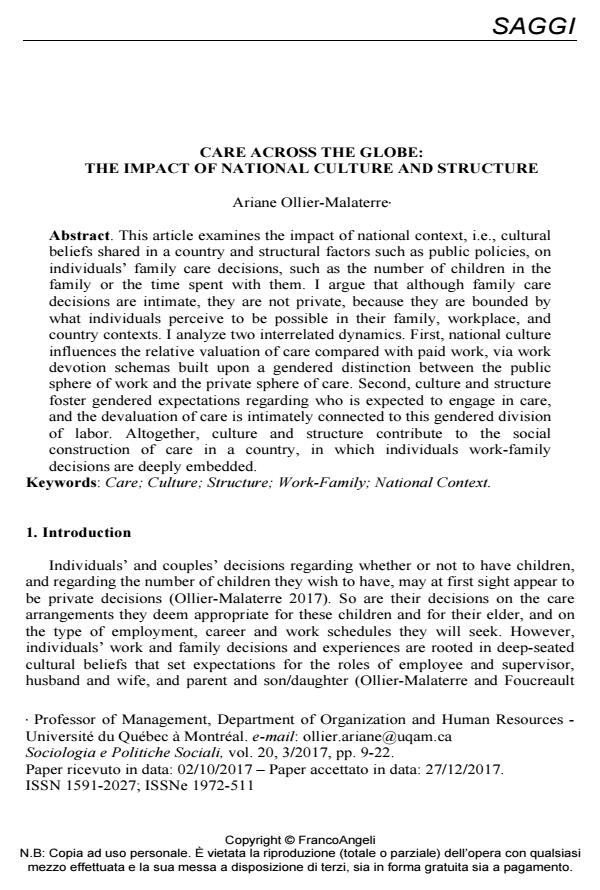Care across the globe: the impact of national culture and structure
Titolo Rivista SOCIOLOGIA E POLITICHE SOCIALI
Autori/Curatori Ariane Ollier-Malaterre
Anno di pubblicazione 2018 Fascicolo 2017/3
Lingua Inglese Numero pagine 14 P. 9-22 Dimensione file 110 KB
DOI 10.3280/SP2017-003002
Il DOI è il codice a barre della proprietà intellettuale: per saperne di più
clicca qui
Qui sotto puoi vedere in anteprima la prima pagina di questo articolo.
Se questo articolo ti interessa, lo puoi acquistare (e scaricare in formato pdf) seguendo le facili indicazioni per acquistare il download credit. Acquista Download Credits per scaricare questo Articolo in formato PDF

FrancoAngeli è membro della Publishers International Linking Association, Inc (PILA), associazione indipendente e non profit per facilitare (attraverso i servizi tecnologici implementati da CrossRef.org) l’accesso degli studiosi ai contenuti digitali nelle pubblicazioni professionali e scientifiche.
This article examines the impact of national context, i.e., cultural beliefs shared in a country and structural factors such as public policies, on individuals’ family care decisions, such as the number of children in the family or the time spent with them. I argue that although family care decisions are intimate, they are not private, because they are bounded by what individuals perceive to be possible in their family, workplace, and country contexts. I analyze two interrelated dynamics. First, national culture influences the relative valuation of care compared with paid work, via work devotion schemas built upon a gendered distinction between the public sphere of work and the private sphere of care. Second, culture and structure foster gendered expectations regarding who is expected to engage in care, and the devaluation of care is intimately connected to this gendered division of labor. Altogether, culture and structure contribute to the social construction of care in a country, in which individuals work-family decisions are deeply embedded.
Parole chiave:Care; Culture; Structure; Work-Family; National Context.
- Social contagion in employees’ assessment of work-life practices: a framework of social contagion processes, assessment dimensions, and national context Ariane Ollier-Malaterre, in Community, Work & Family /2025 pp.541
DOI: 10.1080/13668803.2023.2244656 - (Un)deserving of work-life balance? A cross country investigation of people’s attitudes towards work-life balance arrangements for parents and childfree employees Silvia Filippi, Mara Yerkes, Michèlle Bal, Bryn Hummel, John de Wit, in Community, Work & Family /2024 pp.116
DOI: 10.1080/13668803.2022.2099247 - Boundary Management Permeability and Relationship Satisfaction in Dual-Earner Couples: The Asymmetrical Gender Effect Marcello Russo, Ariane Ollier-Malaterre, Ellen Ernst Kossek, Marc Ohana, in Frontiers in Psychology 1723/2018
DOI: 10.3389/fpsyg.2018.01723
Ariane Ollier-Malaterre, Care across the globe: the impact of national culture and structure in "SOCIOLOGIA E POLITICHE SOCIALI" 3/2017, pp 9-22, DOI: 10.3280/SP2017-003002